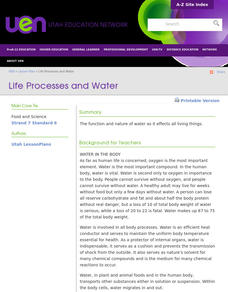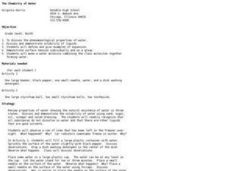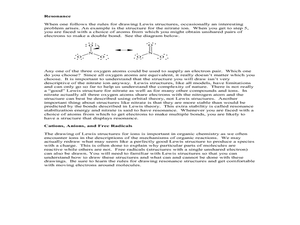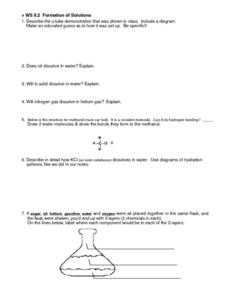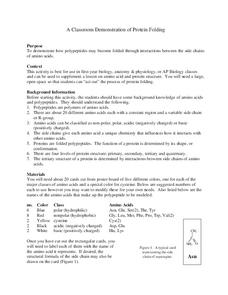Curated OER
Solubility and Intermolecular Forces
In this solubility and intermolecular force learning exercise, high schoolers are given 26 clues about forces between molecules such as hydrogen bonds and London forces and about solubility of solutions.
Curated OER
Identifying Ionic and Covalent Bonds
For this bonds worksheet, students complete a graphic organizer by determining if the compounds given are metals or non-metals and if it has a covalent or ionic bond.
Curated OER
Chemical Bonding in Alkanes
In this alkanes worksheet, students complete a table with the chemical formula, the structural formula and the condensed formula of various alkanes given different numbers of carbon atoms. They answer three questions about valence...
Exploratorium
Indicating Electrolysis
Sure, your learners know water is made up of two molecules, but watching them separate helps the class see the construction like never before. This resource provides directions on how to build a simple electrolysis device using a...
Curated OER
The Chemistry of Life
In this molecule worksheet, students will use a diagram of a water molecule to see how many electrons and protons the molecule has and use a glycerol molecule diagram to discover carbon atom bonds. 5 fill-in-the-blank questions.
Curated OER
Recognizing Polar Molecules
For this polar molecules worksheet, students complete a graphic organizer by writing in the bond type, electron dot diagram, and the type of compound for the chemical compounds given.
Curated OER
Hydrocarbons
In this chemistry worksheet, students use the clues given at the bottom of the sheet to complete the crossword puzzle on hydrocarbons. There are 17 statements to solve and fill in on the puzzle.
K20 LEARN
The Attraction is REAL
How attractive is your intermolecular forces lesson plan? Draw your class in with an activity that includes research, presentation, and demonstrations. Chemistry scholars work together to create claims about the each intermolecular...
SRI International
Science of Water
Water is crucial to survival. Scholars gain an appreciation for water by reading about it, learning about its atomic properties, and investigating its properties through six stations in a lab activity.
Royal Society of Chemistry
Investigating Temperature Changes on Evaporating Liquids—Microscale Chemistry
Is there more to evaporation than just less liquid? Show young scientists the energy transformation that occurs during a phase change through a series of simple experiments. Lab partners place drops of water, ethanol, and ethoxyethane on...
Teach Engineering
Balancing Liquid on a Coin: How Intermolecular Forces Work
Let knowledge of chemistry flow like water. Future scientists conduct two different experiments to investigate the properties of water. They learn about surface tension and cohesion as they see how many drops of water they can place on a...
Curated OER
Common Ions and Their Charges
In this chemistry worksheet, students can use the table to observe and name the common types of ions and determine the charges to explain the gain or loss of electrons.
Curated OER
Periodic Table
In this periodic table activity, students are given 12 terms and must match the terms to their appropriate definition. Topics include types of bonds, types of elements, and types of ions.
Curated OER
Life Processes and Water
Explain the properties of water. Identify the properties of water that make it a polar molecule Describe hydrogen bonds and how they differ from covalent bonds Discuss the differences between hard water and soft water Compare the heat of...
Curated OER
The Chemistry of Water
Students investigate the properties of water. In this chemistry of water lesson plan, students observe a demonstration of the properties of water using sand, sugar, oil, vinegar and salad dressing. Students experiment with water, pepper,...
Curated OER
Water Molecules Can
On its own, this is not an exciting presentation on the properties of the water. It consists only of two slides: the title slide, which informs the viewer that water molecules have hydrogen bonds, and another slide, which lists four...
Curated OER
Drawing Lewis Structures
In this drawing Lewis structures worksheet, students read about the 5 steps taken to draw Lewis structures for atoms and molecules. These include identifying the valence electrons, placing pairs of electrons between atoms to be bonded,...
Perkins School for the Blind
Building an Organic Molecule
Glucose is a simple sugar and a molecule that can be illustrated through modeling. Scientific investigators with visual impairments use hands-on models to reconstruct the process of bonding molecules. The tools used in this activity are...
Curated OER
Biology: Protein Study
Learners in pairs, select and view proteins from the Protein Data Bank. After downloading the tutorial and instructions, they identify the protein's structures and primary biological functions. Then, students present their findings to...
Curated OER
Review Set
The topics covered in these multiple choice questions are about atomic structure and bonding, state configurations, pressure and solution concentration, and energy graphs. This is a midterm review which could be used with the whole...
Biology Junction
The Structure of DNA
Did you know that all life on Earth has DNA? Explore the importance of the molecule by learning about its structure. The unique DNA shape, bases, and bonds allow the incredible diversity seen all over the world.
Curated OER
WS 8.2 Formation of Solutions
In this solutions worksheet, students answer questions about the solubility of various substances in solvents such as oil in water and nitrogen gas in helium. They draw water molecules to show bonding between them and they diagram a...
Southwestern Medical Center
A Classroom Demonstration of Protein Folding
Does the mention of proteins and polypeptide relationships in your classroom result in mass confusion? Does the attempt to teach this important concept generate multiple questions and, at times, lead to a room filled with blank stares?...
Royal Society of Chemistry
Electronegativity Values
Finally, an electronegativity resource your class will be strangely drawn to! Skilled scientists manipulate interactive puzzles to gain an understanding of common electronegativity values. The great thing? You can conduct the lesson...















